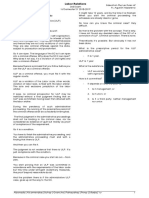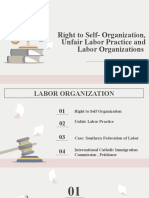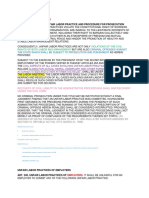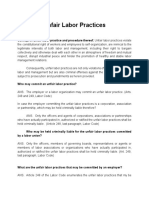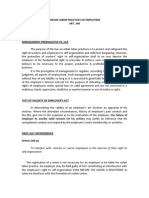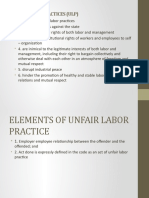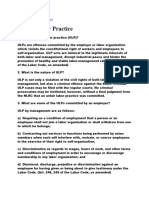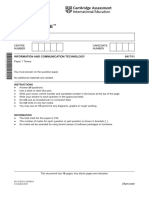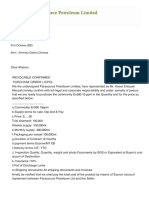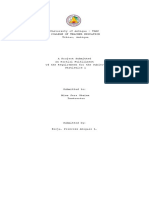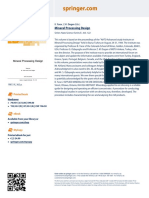Unfair Labor Practices parties.
ULP laws protect the collective bargaining
process, discourage coercive behavior, and preserve the
Unfair Labor Practice- means any unfair labor practice
integrity and voluntariness of union representation.
as expressly defined by the Code.
Parties Liable for Unfair Labor Practices
Is an act of an employer or union-their agents, which
violates the right of workers to self-organization, which 1. Employers: The law imposes liability on
includes the right: employers who commit acts that impede
employees’ right to self-organization and
a. To form a union
collective bargaining.
b. To take part in its formation
c. To join or assist a union of their own choosing 2. Labor Organizations or Their Agents: Labor
for purpose of unions, their officers, and agents may also
d. Collective bargaining and negotiations commit ULPs if they engage in acts that violate
e. To engage in concerted activities for mutual an employer’s or an employee’s corresponding
help and protection rights or disrupt the orderly process of union
recognition and collective bargaining.
2 kinds of ULP:
-General Rule (Employer-Employee Relationship)
1. Employer ULP
2. Union ULP Scope of ULP
Nature and Aspect 1. ULP can be committed only if there exists employer-
employee relationship.
1. Civil aspects of ULP: These shall be under the
XPN: Instances when it can be committed against a
jurisdiction of the LA, who shall resolve such
non-employee (ie. Yellow-dog contract).
cases within 30 calendar days from the time
2. ULP can be committed only against an employee
they are submitted for decision.
who exercises or has exercised his right to self-
NOTE: Recovery of civil liability in the
organization.
administrative proceedings shall bar recovery
under the Civil Code. Exceptions
2. Criminal aspects of ULP: These shall be under
1. The President or the Secretary of Labor is not
the concurrent jurisdiction of the regular courts.
precluded from exercising jurisdiction over an unfair
No criminal prosecution for ULP may be
labor practice which may cause a strike or lockout in a
instituted without a final judgment finding ULP
vital industry
was committed, having been first obtained in
the administrative proceedings before the LA. 2. The parties can enter into an agreement to submit an
During the pendency of such administrative unfair labor practice dispute for resolution by the
proceedings, the running of the period of voluntary arbitrator.
prescription of the criminal offense (1 year from
accrual of such ULP) shall be considered Forms- In bad faith, refusal to bargain, individual
interrupted. However, the final judgment in the bargaining
administrative proceedings shall not be binding Blue-sky bargaining- It is defined as making
in the criminal case nor be considered as exaggerated or unreasonable proposals or economic
evidence of guilt but merely as a proof of demands.
compliance of the requirements therein set
forth. Surface bargaining- Is defined as “going through the
motions of negotiating” without any legal intent to
Purpose: Key Principles and Purpose reach an agreement.
The primary goal of prohibiting ULPs is to maintain
industrial peace, ensure the free exercise of workers’
rights, promote harmonious employer-employee
relations, and foster a productive environment for both
�By Employers (h) To pay negotiation or attorney’s fees to the
union or its officers or agents as part of the
Art. 259. Unfair labor practices of employers. – It shall
settlement of any issue in collective bargaining
be unlawful for an employer to commit any of the
or any other dispute; or
following unfair labor practice:
(i) To violate a collective bargaining agreement
(a) To interfere with, restrain or coerce employees
Employer’s interference: Totality of Conduct Test
in the exercise of their right to self-organization;
(b) To require as a condition of employment that a 1. Direct Interference, such as:
person or an employee shall not join a labor a. When an employer requires an employee to
organization or shall withdraw from one to sign a contract not to join a union (yellow dog
which he belongs; contract);
(c) To contract out services or functions being b. Espionage or surveillance of union members;
performed by union members when such will c. Accepting an offer by the majority of the
interfere with, restrain or coerce employees in employees to abandon their union in return for
the exercise of their rights to self-organization; a wage increase;
(d) To initiate, dominate, assist or otherwise d. Changing work assignments after the employees
interfere with the formation or administration had organized themselves;
of any labor organization, including the giving of e. The closure or shut down of the corporation
financial or other support to it or its organizers shortly after the union had been organized as
or supporters; well as the dismissal of the employees effected
(e) To discriminate in regard to wages, hours of under false pretenses
work and other terms and conditions of
employment in order to encourage or 2. Indirect interference; such as:
discourage membership in any labor a. Anti-union conduct of supervisory employees or
organization. Nothing in this Code or in any by outsiders acting as agents for the employer;
other law shall stop the parties from requiring b. Anti-union conduct or statements of the
membership in a recognized collective managerial employees.
bargaining agent as a condition for employment,
TEST: Whether the employer has engaged in conduct
except those employees who are already
that would reasonably tend to interfere with the free
members of another union at the time of the
exercise of the employees’ right to self-organization.
signing of the collective bargaining agreement.
Employees of an appropriate bargaining unit Yellow-Dog Contract- It is an ULP committed by an
who are not members of the recognized employer against an applicant to require as a condition
collective bargaining agent may be assessed a of employment that:
reasonable fee equivalent to the dues and other
fees paid by members of the recognized 1. He is not a member of a union;
collective bargaining agent, if such non-union 2. If a member, he will resign;
members accept the benefits under the 3. He will not join a labor union.
collective bargaining agreement: Provided, that Contracting out of services and functions
the individual authorization required under
Article 242, paragraph (o) of this Code84 shall Contracting out services being performed by union
not apply to the non-members of the members: It is an ULP committed by employer to
recognized collective bargaining agent; contract out services or functions being performed by
(f) To dismiss, discharge or otherwise prejudice or union members when such will interfere with, restrain
discriminate against an employee for having or coerce employees in the exercise of their right to self-
given or being about to give testimony under organization.
this Code;
(g) To violate the duty to bargain collectively as
prescribed by this Code;
�Company union Filing of charges or giving the testimony
Company or captive unionism- Another form of ULP Dismissal for giving testimony: It is an ULP committed by
committed by an employer to initiate, dominate, assist an employer to dismiss, discharge or otherwise
or otherwise interfere with the formation or prejudice or discriminate against an employee for
administration of any labor organization, including the having given or being about to give his testimony under
giving of financial or other support to it or its organizers the Labor Code.
or officers.
NOTE: It is the only ULP not related to the right of
Other forms of Company Domination: workers to self-organization and collective bargaining.
1. Initiation of the company union idea CBA-related ULPs
a. Outright formation by the employer or his Unions’ ULPs related to Collective Bargaining
representatives; It is likewise an unfair labor practice for a union or its
b. Employee formation on outright demand by officers to:
employer; and
Refuse to bargain collectively with the employer.
c. Managerially motivated formation by employees.
Cause or attempt to cause an employer to
2. Financial support to the union discriminate against an employee who is not a
member of the union.
3. Employer encouragement and assistance
Violate the terms and conditions of a CBA.
4. Supervisory assistance
Payment of Negotiation and attorney’s fees
5. Passivity of the union
ART. 228. [222] Appearances and Fees.
a. If the union makes no effort to procure a CBA;
(a) Non-lawyers may appear before the Commission or
b. If it accepts an agreement lacking the usual
any Labor Arbiter only:
substantive provisions;
c. Failure of the union to hold meetings, elect 1. If they represent themselves; or
officers, collect dues, or to adopt constitution and 2. If they represent their organization or members
by-laws. thereof.
6. Employer becomes more friendly to the union (b) No attorney’s fees, negotiation fees or similar
(captive unionism) charges of any kind arising from any collective
bargaining agreement shall be imposed on any
Discrimination- Is a relative term connoting unequal
individual member of the contracting union: Provided,
treatment.
However, that attorney’s fees may be charged against
Acts of discrimination union funds in an amount to be agreed upon by the
parties. Any contract, agreement or arrangement of any
1. Dismissal lay-off – must be committed because of sort to the contrary shall be null and void.
union activities.
2. Closure or shutdown – due to union activities. Violation of the CBA
3. Rehiring (ie. Delayed reinstatement, conditional
Gross violation of a CBA: It means the flagrant and/or
reinstatement)
malicious refusal to comply with the economic
4. Transfer – when an employee is transferred from
provisions of the CBA (the law between the employer
one job to another, even though it carries the
and the union; impressed with public interest).
same wage rate, if the new job is considered by
the employee to be less desirable and the By Labor Organizations
purpose is discouragement of union activity.
Art. 260. Unfair labor practices of labor organizations. –
5. Retrenchment – due to union activities.
It shall be unfair labor practice for a labor organization,
6. Constructive dismissal
its officers, agents or representatives:
�(a) To restrain or coerce employees in the exercise of Violation of the CBA
their right to self-organization. However, a labor
Gross violation of a CBA: It means the flagrant and/or
organization shall have the right to prescribe its own
malicious refusal to comply with the economic
rules with respect to the acquisition or retention of
provisions of the CBA (the law between the employer
membership;
and the union; impressed with public interest).
(b) To cause or attempt to cause an employer to
Criminal liability for ULPs of Labor organization
discriminate against an employee, including
discrimination against an employee with respect to Criminal liability of officers: The officers and agents of
whom membership in such organization has been corporations, associations or partnerships, OR the
denied or to terminate an employee on any ground officers, board members, representatives or agents or
other than the usual terms and conditions under which members of labor organizations or associations, who
membership or continuation of membership is made have actually participated in, authorized or ratified the
available to other members; ULP shall be held criminally liable.
(c) To violate the duty, or refuse to bargain collectively
with the employer, provided it is the representative of
the employees;
(d) To cause or attempt to cause an employer to pay or
deliver or agree to pay or deliver any money or other
things of value, in the nature of an exaction, for services
which are not performed or not to be performed,
including the demand for fee for union negotiations;
(e) To ask for or accept negotiation or attorney’s fees
from employers as part of the settlement of any issue in
collective bargaining or any other dispute; or
(f) To violate a collective bargaining agreement.
Discrimination- Is a relative term connoting unequal
treatment.
Duty of union to bargain collectively- It is an ULP for a
union to violate the duty, or refuse to bargain
collectively with the employer, provided it is the
representative of the employees.
Anti-featherbedding doctrine
Featherbedding is the term for the situation that exists
when a union insists on inefficient work rules that
require the employment of more workers than is
necessary.
Featherbedding activities/ Make-work activities: This is
an extortion of money or other things of value for
services performed or unperformed by the labor union.
- Demand or acceptance of negotiation fees or
attorney’s fees











